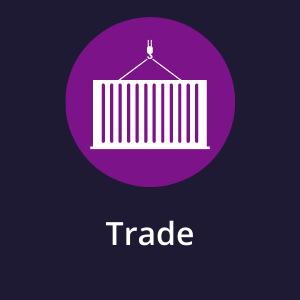Trade

Following the global recession, Brexit and now above all Covid-19, there are fundamental changes taking place in the Commonwealth trade landscape, and the Commonwealth, with its diverse membership, is adapting to and coming to terms with these changes. For this to be successful parliamentarians must be well equipped to understand the implications, particularly around trade agreements, and to drive this agenda at a domestic and international level. CPA UK seeks to support this work through its programmes.
EASTERN CARIBBEAN - STUDY VISIT
A six-member cross-party delegation of members and officials from the UK Parliament visited Barbados and Grenada for a programme of meetings and visits with parliamentary stakeholders, officials and leading civil society members. International trade was a core focus for the delegation, alongside other topical issues including security, climate change and disaster resilience.
At the 2018 Commonwealth Heads of Government Meeting (CHOGM) in London, the UK Government announced its intention to reopen smaller diplomatic posts as part of its commitment to a post-Brexit “Global Britain”. With three new posts created in the Caribbean, the UK now has the largest diplomatic network in the Caribbean of any country in the world.
Against this backdrop, the delegation was in a prime position to meet counterparts in the region to discuss the future of UK-Caribbean trade now that trading relationships previously covered by EU agreements will be revisited.
“It was an incredible experience to visit Barbados and Grenada as part of a crossparty delegation. We touched on a range of issues, including trade, climate change and the fight against crime, all of which are important issues for both the UK and the region. Strengthening our economic, environmental and security partnerships will be of benefit to both sides.”
- Lord Mann of Holbeck Moor
SINGAPORE & MALAYSIA - VISIT
A CPA UK delegation visited Malaysia and Singapore in February 2020 to strengthen parliamentary ties. Across the four-day programme, the delegation covered a variety of issues including trade, defence and human rights with their parliamentary counterparts as well as civil society. Against the backdrop of the Covid-19 crisis, the delegation learnt about all the issues arising from the spread of the virus, including reduced tourism.
In Singapore, the delegation was able to engage in dialogue around the country’s approach to trade and foreign direct investment. Meetings with Enterprise, the government body that supports Singapore’s entrepreneurs to reach foreign markets, provided insights into how Singapore competes in the global market. A discussion with Her Majesty’s Trade Commissioner, Natalie Black, detailed the Department for International Trade’s priorities in Singapore, which is to foster stronger UK-Singapore trade links.
The delegation also explored remaining challenges such as the illicit wildlife trade. As a major regional trade hub served by the Singapore Strait, one of the busiest shipping lanes in the world, Singapore is the second busiest port globally, and port immigration struggles to intercept smuggled items. The delegation was introduced to new legislation to curb illegal wildlife trade, innovatively focusing on financial tracing instead of physical inspection.
Considering the increased need for parliamentarians to understand trade and trade agreements, delegates benefited by learning about key achievements and remaining challenges for UK trade links with Malaysia and Singapore.
BOTSWANA - VISIT
CPA UK’s visit to Botswana in February 2020 re-energised the relationship with its first bilateral visit to the country in a number of years. Both the UK and Botswana started a new parliament following elections in 2019. The four-member UK delegation engaged with new and returning members in Botswana to explore a number of themes, including women’s representation and parliamentary scrutiny, alongside areas specific to the Botswana-UK relationship, such as economic diversification and wildlife conservation.
The delegation heard about the central position of diamond extraction to Botswana’s economy. The Government receives 80% of the profits from raw diamonds, allowing them to provide free healthcare and education up to the age of 13. Botswana is also aware of the importance of an over-reliance on one industry and is pushing to diversify its economy. The Chair of the Finance, Trade and Economic Development Committee explained that Botswana was working through the UN sustainable development goals in order to diversify towards both agriculture and tourism.
Some of the most open debates concerned wildlife conservation, particularly Botswana’s approach to managing its elephant population, which is the world’s largest. In 2019 Botswana ended its moratorium on elephant hunting, which caused a substantial backlash from the conservation community. Botswana maintains that its approach strives for co-existence between humans and wildlife by protecting its elephants – for instance through transfrontier agreements – but managing the population through hunting.
CPA UK looks forward to continuing dialogue with Botswana and intends to welcome a Speaker led delegation in 2020/21